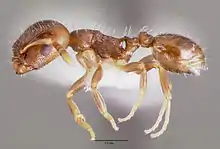Temnothorax americanus
Temnothorax americanus is a species of slave-maker ant in the genus Temnothorax. The ants are 2–3 mm in size, and endemic to the northeastern United States and adjacent Canadian regions.[1] They do not forage for food, but instead 'scout workers' from the colony seek out nearby host colonies of ants (e.g. Temnothorax longispinosus),[2] steal larvae and bring them back to their own colony. A small T. americanus colony could consist of a queen, two to five workers and thirty to sixty slaves.[3]
| Temnothorax americanus | |
|---|---|
 | |
| Temnothorax americanus worker | |
| Scientific classification | |
| Domain: | Eukaryota |
| Kingdom: | Animalia |
| Phylum: | Arthropoda |
| Class: | Insecta |
| Order: | Hymenoptera |
| Family: | Formicidae |
| Subfamily: | Myrmicinae |
| Genus: | Temnothorax |
| Species: | T. americanus |
| Binomial name | |
| Temnothorax americanus (Emery, 1895) | |
In a study published in Animal Behaviour, researchers showed that T. americanus scouts target stronger colonies over weaker ones to steal larvae from.[3][4]
It was formerly placed as the sole member of the genus Protomognathus.[5]
References
- Social Insects Specialist Group (1996). "Protomognathus americanus". IUCN Red List of Threatened Species. 1996: e.T18379A8177548. doi:10.2305/IUCN.UK.1996.RLTS.T18379A8177548.en. Retrieved 17 November 2021.
- Modlmeier, Andreas P.; Foitzik, Susanne (2011). "Productivity increases with variation in aggression among group members in Temnothorax ants". Behavioral Ecology. 22 (5): 1026–1032. doi:10.1093/beheco/arr086. ISSN 1465-7279.
- Davies, Davies (8 November 2010). "Slave-making ants target the strong not the weak". BBC News. Retrieved 21 August 2014.
- Pohl, Sebastian; Foitzik, Susanne (2011). "Slave-making ants prefer larger, better defended host colonies". Animal Behaviour. 81 (1): 61–68. doi:10.1016/j.anbehav.2010.09.006. S2CID 53177420.
- Ward, Philip S.; Brady, Sean G.; Fisher, Brian L.; Schultz, Ted R. (2015). "The evolution of myrmicine ants: phylogeny and biogeography of a hyperdiverse ant clade (Hymenoptera: Formicidae)". Systematic Entomology. 40 (1): 61–81. doi:10.1111/syen.12090. ISSN 1365-3113. S2CID 83986771.
This article is issued from Wikipedia. The text is licensed under Creative Commons - Attribution - Sharealike. Additional terms may apply for the media files.
